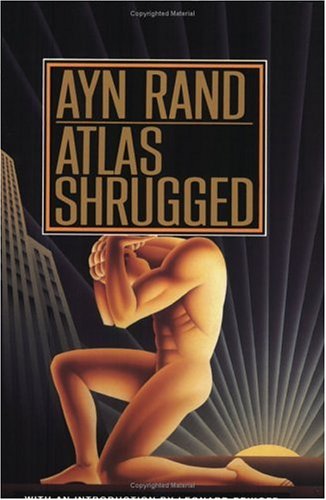Atlas Shrugged by Ayn Rand

Atlas Shrugged by Ayn Rand sparked much debate when it was originally published in 1957. Critics argued that it promoted a selfish lifestyle, while supports said it Ayn Rand’s philosophy embodied the American dream. I have never studied philosophy before so I lack the credentials to give a formal review, but I would still like to explain my thoughts and feelings I had while reading the book.
For one, after reading the book I do not object Objectivism. The core idea that man should be free to think and use his mind to produce without interference is something I can relate to. My most enjoyable days are those where I’m reading a textbook, tinkering with a program or trying to improve my writing skills by creating a blog post. One premise in common with all of these activates is the use of my mind. Objectivism states that preventing men from thinking rationally is equivalent to murdering them. This, I believe, all of us can agree upon.
Probably the most critical part of Objectivism is the idea that capitalism is the only form of government that men should live by. It’s hard to argue the facts. In the last couple hundred years, the United States has seen more progress in science and technology that has helped to better our lifestyle than the previous five hundred years in which religious lead feudal systems dominated most countries. The other part of Objectivism hinted throughout this book that has gained much criticism has to do with charity. Dagny, one of the protagonist, states a few times that she does not give to charity. Objectivism states that men should not depend on others, that the incapable should not become parasites that suck the life out of the capable, that the producers should not be punished. When I read the parts of the book concerning this topic, the welfare system immediately popped into my head. In my opinion, we need the welfare system. It has a purpose and without it or charity in general communities may become susceptible to deterioration. But too much of this can be a bad thing. There are people out there that spoil it for those who truly need it. The people who expect it are the ones who are in fact stealing from the system. There is a tipping point of the system and I have no idea how close we are to it. Part of charity is given back to the community, which in my option is the most import aspect. I personally want to live in a healthy, vibrant community. Donating to local theaters adds to my enjoyment. Chipping in to help a fellow neighbor can raise the living standard of the entire community. Even buying local helps everyone. Is giving to charity for selfish reasons acceptable to the Objectivism philosophy?
This book centers around corrupt governments. Organizations with power will generally try to keep or expand the power, and governments are no exceptions. They do consists of people. Objectivism states the less government the better. While I guess I can agree with this in general, there are so many exceptions that positioning myself on one side or the other is something I’ve never been able to do. Each situation seems unique to me. For a contrived example, I believe pubic roads are a good thing. We can travel more and it helped the shipping businesses. And what about utilities. The book repeatedly stated the only roll of the government should be to protect the citizens from force. But if a electricity distribution company wants to build power-lines across public roads, should it not be regulated? The same questions arise from airwaves and more. And it is these questions the book did not answer. Perhaps the answers lie in other Objectivism literature.
Because the book poised many questions, got me thinking about many of my beliefs, reinforced the concept of rationality and hard work, I ended up enjoying it. The story by itself may actually be a little bland, but all the concepts the characters portray made it interesting. Except for a few parts it was not a page turner, but a book that made me feel better about myself and my hard work. I am now more interested in philosophy and will pursue more material on the subject in the future.